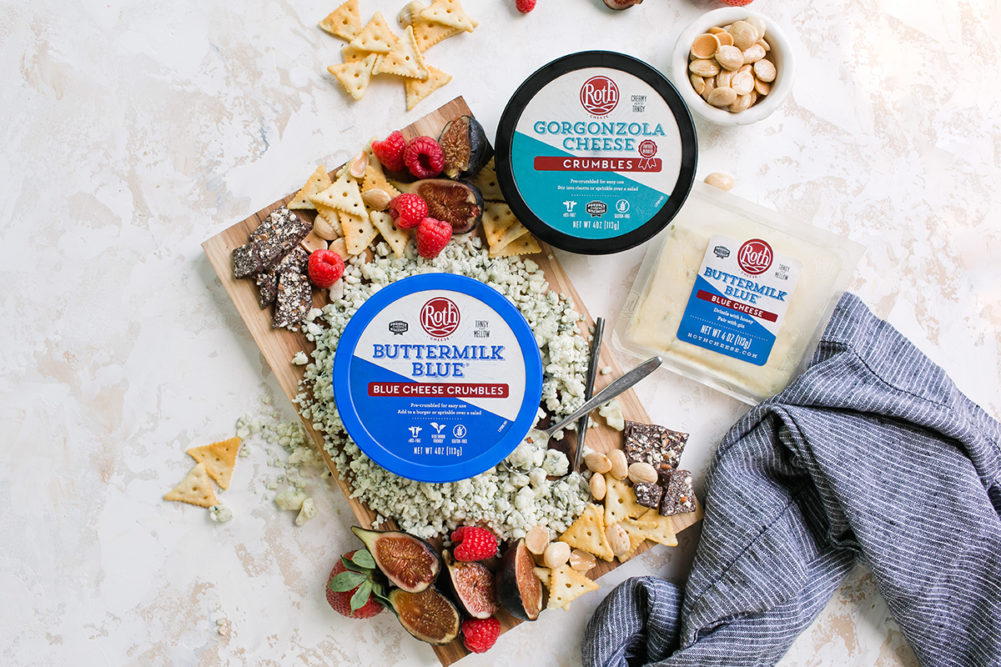Suppliers and their retail partners are pushing specialty blue cheeses as a way for consumers to add variety to charcuterie boards, recipes and other use occasions.
The blue cheese category has remained relatively steady for the past four years, said Amie Wentz, director of brand management for Emmi Roth.
Many people think of using blue cheese mainly as a salad topping, Wentz said. Emmi Roth is trying to widen consumers’ imaginations, looking for ways to increase usage occasions.
“With our culinary and digital marketing expertise and strategic social media partnerships, we continue to leverage our award-winning cheese to drive expansion of the blue cheese category and to drive growth into the future.”
Jenny Englert, Saputo USA’s marketing director, also uses the word “steady” to describe blue cheese growth at retail.
As charcuterie and cheese boards are still having a moment, Saputo is seeing more and more people reach for blue cheese as an interesting addition to their favorite board, she said. The company is also tracking greater interest in blue cheese crumbles for toppers and salads.
And with the rise of social media food content, Saputo is now seeing young people become more familiar with and including blue cheese in their cooking repertoire.
“We encourage this trend of experimentation and look forward to the category growing as customers’ curiosity continues to peak around this unique cheese.”
When it comes to trends within the blue cheese category, Wentz said there has been a shift away from chunks and toward crumbles. That’s due to the versatility of crumbles and the ease of sprinkling them on things like salads, burgers or wraps.
Emmi Roth’s current blue cheese lineup includes Roth Buttermilk Blue, Roth Gorgonzola, Athenos Blue Cheese and Athenos Gorgonzola in retail packages, including wedges and crumbles.
The company also offers wheels of Smoked Moody Blue Cheese, Buttermilk Gorgonzola and Buttermilk Blue Affinée for cut and wrap programs.
Brand refresh
With the holidays upon is, it’s a great time for customers to start exploring with blue cheese, Englert said – topping it on favorite side dishes, proteins or salads, including it on charcuterie and cheese boards, or incorporating it in sauces. This summer, Saputo launched a new brand campaign and packaging overhaul for its cave-aged blue cheese brand, Treasure Cave.
The new logo features a cave with an opening in the shape of Wisconsin, the package design has larger windows for product visibility, and the packaging lists the blue cheese’s flavor and age details.
Several months in to the rebrand, the company is very happy with its success, Englert said.
“Customers and retailers alike have been receptive to the campaign and the new packaging alike. The campaign itself has a lighthearted, curious tone, and has intrigued customers enough to give blue cheese more consideration.”
The modern look of the new packaging, Englert added, has captured the eyes of customers and has been well received, with many customers liking the Wisconsin cave-mouth shape.
And the larger windows of the packaging also allow for better product visibility, which further encourages customers to pick up the product, examine it and explore the world of blue cheese, she said.
The Treasure Cave blue cheese brand dates from the 1930s, when cheese was made inside caves in Faribault, Minn. Treasure Cave is now made in a processing facility in Almena, Wis., with curing cells.
Saputo markets other blue cheeses in addition to Treasure Cave. They include:
Organic Creamery
Organic Creamery blue cheese is easily distinguished by the gorgeous blue-green veins that run throughout the cheese’s marbled interior, Englert said. Its flavor is remarkably delicate with a slightly tangy hint that works well in salad dressings and dips. It’s handcrafted by skilled Wisconsin cheesemakers with 100% organic milk, giving it an appealing and distinctive flavor and texture.
Salemville
Salemville is a line of award-winning, blue-veined cheeses known for their smooth, earthy flavor that perfectly accentuates burgers, salads and cheese plates, Englert said. The line’s rich and creamy texture is dotted with gorgeous veining and serves as the perfect counterpart to dessert wines.
Stella Blue Cheese
Stella Blue Cheese features the trademark attributes that true blue cheese lovers seek, Englert said: a delectably rich and tangy flavor and an easy-to-crumble, semi-soft texture that’s perfect for salads and sauces.
Stella Gorgonzola
Stella Gorgonzola features a pleasantly mellow but tangy flavor that’s frequently described as “earthy.” This Italian-style cheese is named after the town of Gorgonzola, located in the Po Valley near Milan, Italy. It’s noticeably creamier than traditional blue cheese, Englert said, making it the perfect addition to mashed potatoes. It can also be used to easily add a robust flavor to grilled meats and salads.
This article is an excerpt from the December 2023 issue of Supermarket Perimeter. You can read the entire Blue Cheeses feature and more in the digital edition here.

